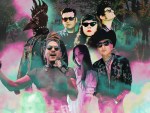The Mess is a new column from journalist Richard Villegas, who has been reporting on new, exciting sounds flourishing in the Latin American underground for nearly a decade. As the host of the Songmess Podcast, his travels have intersected with fresh sounds, scene legends, ancestral traditions, and the socio-political contexts that influence your favorite artists. The Mess is about new trends and problematic faves whilst asking hard questions and shaking the table.
We’re going there. We’re talking about it. Even if things get a little messy.
Argentina is constantly catching heat. And I’ve been thinking about how the most spirited gabs have likely never tasted the sugary glory of flan mixto or strolled down the street cinematically sipping a mate gourd. But I get it. Famously proud and gregarious, often to the point of arrogance, Argentines go against the grain of Latin American humility and over-courteousness, itself a byproduct of centuries of colonialism. However, it’s about time we have a real talk about the selective hateration constantly hurled at Argentina, and the blind spots it creates.
During Billboard’s Latin Music Week back in October, a panel on women in music drew fire for only featuring white and light-skinned Latinas. Though criticism should have been aimed at the event organizers, the brunt of the backlash went to Nathy Peluso and Nicki Nicole while omitting Puerto Rican artists Young Miko and Kany García, who also don’t embody the Afro-Caribbean diaspora. Likewise, on a recent story I wrote for this very site about women in Argentina creating boundary-pushing trap and perreo, vitriol over the white-washing of reggaeton flooded in from the same people who click on every post about Bad Bunny, Rosalía, and Peso Pluma.

It’s not merely a matter of whom we’re directing our anger toward — the discourse itself is myopic, robbing listeners of discovering new and diverse music. I keep hearing that rock is dead when Argentina’s new generation of bands is injecting fresh, pummeling energy into garage, post-punk, and grunge. Just look to Nenagenix, Bestia Bebé, Las Tussi, and Winona Riders, all of whom have performed at Primavera Sound Buenos Aires. Meanwhile, recent spectacular records from rappers Sara Hebe and Dillom haven’t even made a blip among my stateside peers, who often dismiss Argentina’s genre-blurring scene as acolytes of Duki and Bizarrap. Hell, I was one of those people until I saw singer, rapper, and demonic entity K4 emotionally wreck a packed room of 300 last year.
Do not mistake this for a “Leave Argentina Alone!” rant. After all, many of the criticisms are fair. But you’re likely reading this from the U.S., where millions of Latines aligned with a white supremacist in the 2016 and 2020 elections. And just last month, devious strategies were exposed within Univision that will likely increase those numbers in the next election. So let’s not throw stones in the glass house of white aspirationalism.
In Latin America, one of the recurring gripes with these complex conversations of race and colorism is how the U.S. expects everyone to internalize the minutiae of our tangled race relations while making no effort to reciprocate. Argentina is understandably perceived as a white nation, the result of concerted efforts to foster European immigration starting in the mid-1800s, coupled with the genocide and displacement of indigenous communities across the territory. But perpetuating default Euro-centricity erases the enduring native peoples in the country’s northern region and the waves of Black Cape Verdeans who arrived throughout the 1930s and ‘40s.

The diversity is unmistakably there, waiting to be acknowledged. Artists like Mercedes Sosa and Tayhana built trailblazing international careers while also speaking on their experiences as mixed-race “morochas” (or brunettes of darker skin) and the problematic rhetoric they’ve faced. Reggae legend Fidel Nadal and non-binary rapper Luanda have long drawn attention to the plight of Afro-Argentines, using their music as a canvas for searing tales of racism and resistance. Argentina’s indigenous rhythms and instruments have also nourished prismatic works from Feli Colina, Diosque, and Chancha via Circuito.
The self-proclaimed “Mejor país del mundo” is a land of extreme contrasts. Despite boasting trailblazing reproductive rights and marriage equality movements, a month ago, they elected deranged libertarian and dictatorship apologist Javier Milei as their new president. Moreover, social media would have you believe Argentina is a latent outpost of the Third Reich while also home to one of the largest Jewish communities in the world and lax immigration laws keeping the country regionally attractive regardless of dizzying economic woes. Argentina, like any nation, is a mosaic of contradictions and complexities, and sweeping judgments can obscure the nuanced realities that define its people.
So let me tell you about the Argentina that I know. I lived in Buenos Aires throughout 2009, a time during which I learned about Porteños and their all-consuming love of fútbol, the casualness of clubbing all weekend until dawn on a Tuesday, and fabulous cuts of meat that were frankly under-seasoned for my taste. The country’s public education system is phenomenal and free, and healthcare is also easily accessible and affordable – things to which, as a gringo, I could not relate.

I returned to Buenos Aires in 2022 to attend a landmark run of KEXP live sessions spearheaded by radio titan Albina Cabrera, which featured incredible performances from Juana Molina, Bandalos Chinos, and Blanco Teta. The sessions underscored another massively important fact: Buenos Aires is not Argentina, with the weeklong festivities spotlighting plurality. Other rocking highlights included Mi Amigo Invencible and Las Ex of the mountainous wine region of Mendoza, as well as noisy Patagonian favorites Atrás Hay Truenos, Fin Del Mundo, and Marina Fages.
I encourage anyone reading this to actually get to know Argentina — flaws and all — before discarding it from the cultural zeitgeist the same way Milei plans on tossing progressive government ministries and the Central Bank at the first sighting of a Four Loko sponsorship.
I encourage anyone reading this to actually get to know Argentina — flaws and all — before discarding it from the cultural zeitgeist the same way Milei plans on tossing progressive government ministries and the Central Bank at the first sighting of a Four Loko sponsorship. Over on Songmess, we’re currently rolling out a 50-episode series focused on Argentina, featuring interviews with the artists mentioned above and getting into the nuances of scenes and territory. Or, if you would rather keep reading, I also recently examined Argentina’s legendary rock history with breakdowns of each region and key players, past and present.
Heavy is the title of “Mejor país del mundo,” but if anyone has demonstrated they can carry the weight of the world [cup] with aplomb, it’s Argentina. I understand why the cockiness is grating to so many, but be careful with taking that motto at face value. Most locals use the phrase with a mix of ardent love for their country and an ironic wink to the never-ending barrage of political and economic turmoil. I can’t say that nationalistic rallying cries of “America No. 1” or “Make America Great Again” have ever rung with that much self-aware humor.





